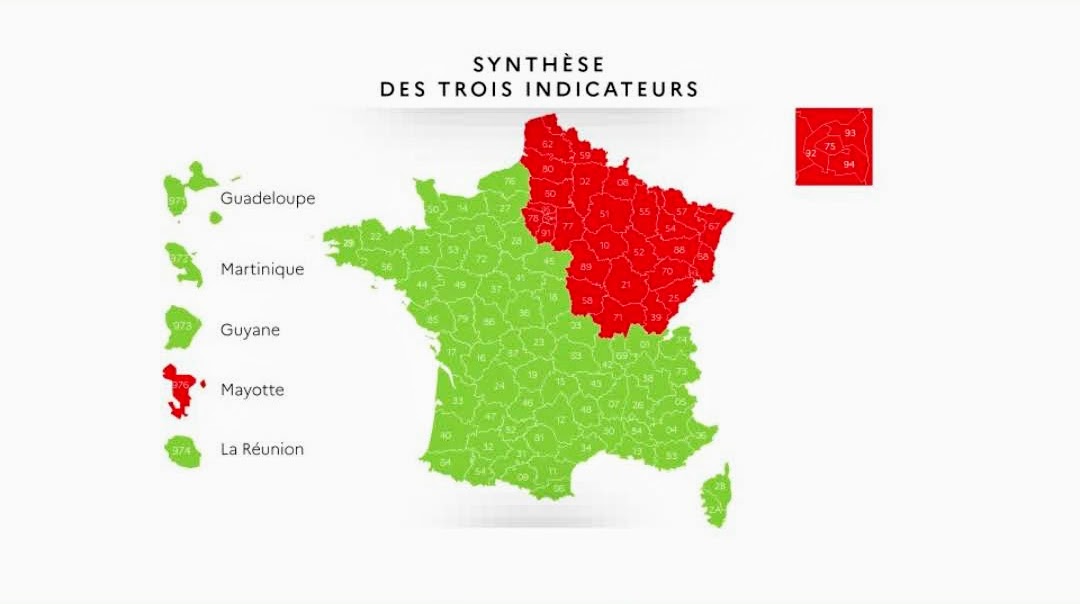Current Covid France Update : Latest Restrictions and Regulations
I’ve had quite a few of you ask how things are going over here in Paris with the virus and life in general. I felt that maybe I should write something up to let you know where we are at since we’re on the other side of the pond.
This post will be updated on a case-by-case basis when there is new information to be shared.
Please use the Table of Contents if you would like to skip to a specific section.
Table of Contents
Current Restrictions
May 16, 2022
As of Monday, May 16, 2022, masks are only required in hospitals and other health establishments. They are not required anywhere else, but are still highly encouraged.
There is no need for the vaccine pass (which was originally the health pass) to enter specific establishments. The vaccine pass is however still needed for hospitals and health establishments.
5th Wave: November 25, 2021
The Health Minister, Olivier Véran, gave a press conference on the afternoon of November 25, 2021 in regards to the 5th wave that is currently hitting France. Here’s what’s been implemented :
- Starting from Saturday, November 27, 2021, booster shots will be available to anyone 18 and older in France with the time frame between the 2nd dose and the booster being shortened to 5 months instead of the previous 6 months.
- The health pass will no longer be valid (it will become inactive) if you have not received your booster shot. The validity of the health pass has been extended to 7 months in total (after the last dose). This means that 7 months after your most recent dose, if you have not received an update, it will be come inactive.
- From December 15th, those 65 and older who have not received their booster shot, the health pass will become invalid.
- From January 15th, this extends to those 18 and older.
- In order to update your health pass, you will need to scan the QR code associated with your vaccination appointment into the TousAnitCovid app.
- From Monday November 29, PCR and Antigen tests now have a validity of 24 hours (down from the previous 72 hours) in the TousAntiCovid app. That means that if you choose to not be vaccinated, you will need to be tested every 24 hours if you want to use the health pass.
- Masks will now be required for all indoor public spaces, even those using requiring the health pass. This will affect tourists attractions, cinemas, theaters and leisure centers. Restaurants, bars and cafes will require a mask when moving around the establishments, but not when seated (while eating or drinking).
- Some large outdoor events/spaces will require health passes as well as mask wearing.
- As of Monday, November 29th, primary school classrooms will not close entirely even after a student has tested positive for Covid. The other students in the class will need to take a Covid test for proof of negative (or positive) results. Those who are negative will be allowed to return to class.
Presidential Address : July 12, 2021
President Macron addressed the nation at 8 PM On Monday, July 12, 2021. Here’s the latest in restrictions and regulations :
- Those who work in the health care sector will have until September 15th to be vaccinated. Starting from the 15th, there will be checks to ensure that all personnel has been vaccinated.
- Those who work in any other sector that received the public has until 30th August to be vaccinated.
- The health passport will be extended and utilized in places where gatherings of 50 or more people (theaters, cinemas, cultural spaces, etc…) as well as in restaurants, bars, and cafés (this also includes sitting on a patio) from 21 July. Click here to read about the health passports and what they entail.
- Sometime in the fall, PCR and antigen tests, will no longer be free for everyone; unless with presentation of a prescription. Currently they are 49€ for the PCR and 29€ for the antigen for non-French persons. There has not been a price set or a specific date chosen.
- Border control will be tightened and enforced. It is highly encouraged to avoid areas where the virus is circulating heavily (UK, Spain & Portugal at this time).
- A campaign of a third injection will start in September for those who were vaccinated in January and February. There will also a campaign for middle schoolers and high schoolers at the beginning of September before the start of the school year.
Déconfinement n°3 : from May 3, 2021
April 29, 2021: President Macron was set to speak on Friday, April 30, 2021 in regards to the easing of lockdown n°3 for France. Today, he decided to forego the (now) traditional live television broadcast, instead he had a press conference with regional French news outlets where he shared the plan for easing our third lockdown .
As of May 3 :
- The 10 km limit will be lifted in terms of travel. We will also no longer need the attestation for leaving during the curfew hours of 7 PM and 6 AM.
- All programs up to middle school will return to the classroom at 100% while high schools will only be at 50% on premise.
- All the other rules, unless otherwise stated, are still in effect .
As long as the health situation allows it the following will be implemented on a regional basis :
From May 19 :
- The national curfew will be moved from 7 PM to 9 PM.
- Businesses that have been deemed “non-essential” are allowed to reopen; this will also include cinemas, theaters and museums , of course with guest restrictions.
- Cafés, restaurants, bars, and other food-service establishments will be able to reopen with their outdoor eating spaces only. The maximum number of guests per table will kept at 6, like last year .
- The number of people allowed to gather together in public will be upped from 6 to 10 .
- Open-air and covered sports facilities will be allowed to host spectators, with guest restrictions of course.
From June 9 :
- The national curfew will be moved from 9 PM to 11 PM.
- Rule previous set in place with remote working will slowly be relaxed.
- Indoor seating in restaurants, bars and cafés will be allowed to open; with a maximum of 6 people in a group at a table.
- A passe sanitaire (health pass) will be required for certain events or areas .
- It will also be required for non-EU tourists and visitors entering France.
- Public cultural spaces and sporting events may be allowed to host up to 5000 attendants with a pass sanitaire.
- Indoor sport facilities and gyms will be allowed to open to the public.
From June 30 :
- The national curfew will be completely lifted.
- It will be possible to participates in any evet, indoor or outdoor, with a maximum number of 1000 attendants and a passe sanitaire.
For those living in France, the health pass will be tracked by the TousAntiCovid app that has been reformulated to store and house vaccination reports as well as PCR test results.
Lockdown n°3 : March 2021 to May 2021
March 31 Presidential National Adresse
March 31, 2021 : 20h CEST. President Macron adressed the nation during a live broadcast of the next steps during this 3rd lockdown.
The current lockdown restrictions that are in place for the current 19 départements are now in place for all of France. These measures will be in place starting this Saturday, April 3, 2021 and be in force for 4 weeks, until May 3, 2021.
On top of these restrictions being present in all of France, schools from preschool all the way up through high school will be closed temporarily starting Tuesday, April 6. (Easter Monday is April 5).
In France, the country is divided into 3 scholarly zones and these zones indicate when schools take their holidays so as not to have everyone on the same schedule. This year, all the zones will have their spring holidays at the same time.
- The week of April 5, preschools will continue classes, but the other levels will start distance learning.
- From 10 to April 25, all zones will have spring holidays at the same time.
- From April 26, the preschools and elementary schools will return to in-person classes while middle school and high school students do distance learning again.
- From May 3, all middle school and high school classes can return to in-class learning.
In regards to the vaccines program, starting from April 16, adults 60 years and older (even with no underlying sickness) will be eligible for the vaccine. May 15th, all adults from 50 years and older and from mid June the vaccines will be open to everyone else.
On a final good note, from mid-May, certain restaurants and cafés and other businesses will be eligible to open back up.
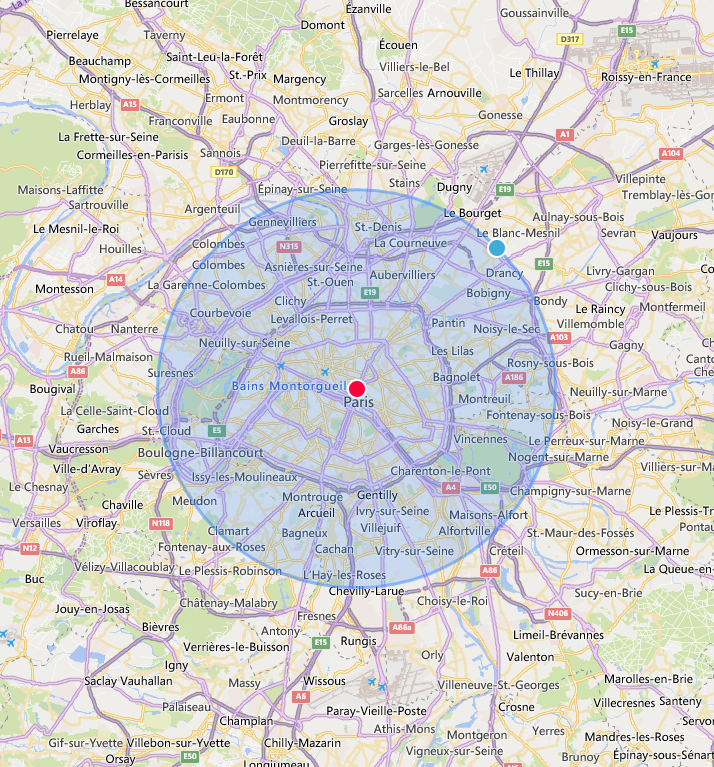
France is currently experiencing her 3rd wave of the virus and we entered our third lockdown on March 19, 2021. There is a curfew in place from 7 PM to 6 AM.
There are 19 départements (regions) in France that are under this lockdown. They are : Aisne, Alpes-Maritimes, Aube, Essonne, Eure, Hauts-de-Seine, Nièvre, Nord, Oise, Paris, Pas-de-Calais, Rhône, Seine-et-Marne, Seine-Saint-Denis, Seine-Maritime, Somme, Val-de-Marne, Val-d’Oise and Yvelines.
We are not supposed to venture more than 10 kilometers from our place of residence. Luckily, this includes everything with the péripherique and some of the banlieue. We do not need a permission slip with reason to leave our house, just proof of address.
Working from home is being highly recommended 4 out of the 5 days, if possible. If for some that they need to go into their respective office buildings, there needs to be an alternating schedule so the offices are not to exceed capacity versus space.
Borders were closed again to travelers, siting motifs imperieux for entering / leaving the country. People arriving into France need to provide a negative PCR test that was administered within the last 72 hours.
Shopping centers larger than 20k sq ft, that do not sell essential items, are to close. Bookstores, hair salons, florists are allowed to stay open ( like lockdown n°2), as well as food stores and pharmacies. Anything else is considered non-essential and must close. Most stores that have had to close have pivoted to click & collect or selling items online through social media.
The next scheduled update on the overall health situation and restrictions in France is for Thursday, April 1, 2021.
Pre-Lockdown n°3 : January to March 2021
The British variant was spotted on the 19 December and has slowly become more and more prevalent.
January 1, 2021, 15 départements have had their curfews changed from starting at 8 PM to now 6 PM because the virus is circulating more rapidly in these areas :
- Hautes-Alpes
- Alpes-Maritimes
- Doubs
- Ardennes
- Jura
- Marne
- Haute-Marne
- Meurthe-et-Moselle
- Meuse
- Haute-Saône
- Vosges
- Territoire de Belfort
- Moselle
- Nièvre
- Saône-et-Loire
France has a slow rollout to the vaccine program and has received a lot of slack within the first two weeks of debuting the vaccine. On January 8, Moderna vaccine has been approved for use in France for those 18 or older.
The 10th of January saw the addition of 7 new départements to the list with a curfew starting at 6 PM instead of 8 PM : Côte-d’Or, Haut-Rhin Bas-Rhin, Cher, Allier, Vaucluse, Alpes-de-Haute-Provence and Bouches-du-Rhône . And two days later, Var and Drôme were added to the list as well bringing it to a total of 25 départments on a 6 PM curfew.
On Saturday 16 January, the 6 PM curfew will be officially extended to the entirety of the Hexagon as numbers continue to creep back up.
The Scientific Council has come out with a new recommendation in regards to face masks ; that home-made masks do not provide enough protection and that category 1 masks are recommended over any others. This category includes FFP2filter masks and blue surgical masks. The key is to look for Type I, Type II or Type IIR as well as a filtration level of 90 percent or more.
There was a last minute meeting of the Defense Council on the 29th January, no lockdown imposed, but there are some new restrictions.
- Travel ban in and out of France from outside the EU, with an exception only for vital travel with proper documentation.
- All arrivals into France from within the EU must present a negative PCR test.
- All non-food shopping centres larger than 20,000 square meters will close until further notice.
- Working from home is still in place and has not changed.
- Police force will be ramped up in order to provide safety checks.
At the beginning of February, France makes it legal for workers to eat lunch at their desks (restricted previously) to help curb the spread of the virus.
These are the current variants that are circulating around France of the virus : British ( accounts for more than 60% of cases), Brazilian, South African, and Breton.
Weekend lockdowns have been put in place starting on Saturday February 27 for the following areas : Nice, Dunkirk, and the French Riviera.
Lockdown n°2 : October to December 2020
14 October, President Macron announced a curfew from 9 PM to 6 AM would be imposed in the greater Paris region and several other cities in the Hexagon for the next four weeks. This curfew impacted the following areas :
- Paris
- Grenoble
- Lille
- Lyon
- Aix-Marseille
- Rouen
- Saint-Etienne
- Montpellier
- Toulouse
The health emergency will also be reinstated, which will allow for the government to work in new, stricter measures in regards to the pandemic.
On the 30th of October, France entered a second lockdown in an effort to curb the spreading virus. This lockdown would go through till December 1st, but could be extended to last longer if the numbers did not change for the better. We once again need our beloved attestation form in order to leave the house as well as practically the same list of reasons for being allowed outside.
Traveling within France will not be allowed, but since the holidays are on, people will be given leeway to return to their homes. Religious ceremonies are not allowed (burials are limited to 30 people and weddings limited to 6), but places of worship are allowed to stay open.
School will remain open, despite being closed in the first lockdown. Most after-school activities will close, except those that also provide child-care in the evening .
Télétravil has become the generalized new normal, it should be allowed, where possible, and employers need to adapt to allow their employees the ability to work from home. Lucky for us, public services will continue to function, while maintaining sanitary measures.
Non-essential shops, like in the first lockdown, will close. Open-air markets will be allowed to stay open and operate.
Unlike the first lockdown, parks and gardens will remain open. This was a sticking point during the first lockdown and became a hot subject towards the end.
Restaurants will now have to close their dine-in options and will only be allowed to offer take-away. Cinemas, theaters, museums and any other place that receives the public that is non-essential will also close.
Public transportation will be allowed to continue to run, public offices will remain open and wearing a mask when out in public will still be enforced.
Mayor Hidalgo instated a curfew for Paris starting on November 6th, starting at 10 PM. This will greatly affect the establishments selling take-away, meaning they will need to be finished serving at 10 PM.
As of November 20, the sale of Christmas trees has been deemed “essential”.
Starting the 28th November, we are now allowed to move within 20 km of our homes and be outside for 3 hours instead of 1. Non-essential shops will be allowed to open back up until 9 PM.
As of December 15th, there is no more need for the attestation form to leave your residence; lockdown has officially ended. But, there is now a national curfew that will be put in place from 8 PM to 6 AM. This curfew will be lifted only for Christmas Eve, December 24th, when most French families celebrate Christmas together in the evening.
27th December marks the beginning of the vaccine campaign in France with the Pfizer vaccine.
Return to Partial Normality : June to September 2020
Phase 1
Lockdown officially ended May 11. The French government released the official plan at the end of April, with a timeline of when, where and how things would slowly open back up. There are 3 big areas that all need to be met before the opening of the flood gates :
- The number of new diagnosed cases being reported.
- The levels of capacity in the ICUs.
- Whether or not local authorities around France have a solid comprehensive testing and tracing program set in place.
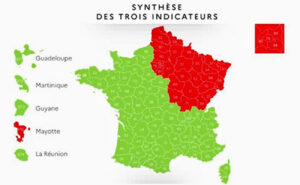
With the data from these 3 points, France has been divided into Red and Green zones. The départements in the green zones were able to open up starting May 11, while those still in red had to wait till numbers dropped down below the 3 markers.
Things that are allowed to resume regardless of red or green :
- Elementary schools are allowed to open back up, step by step.
- Cafés, bars, and restaurants will still stay closed (take-away allowed) until it can be further reviewed at the end of May.
- We no longer need the permission slip to leave the house. We can also travel up to 100 km from our home .
- Groups of up to 10 are allowed to meet in public and private.
- Beaches along the coast will still remain closed until June.
- Libraries, bookshops, hair salons and small museums (certain requirements), forests and cemeteries will also reopen on May 11th.
Cinemas, theaters, museums, beaches, sports facilities, and campsites are still closed across the board.
If the green départments can maintain for three full weeks, they will be able to move on to the next stage of the plan.
In Paris, on the first weekend of déconfinement, the city banned the consumption of alcohol along the Canal and river banks to avoid groups of people gathering together.
On the 24th of May, churches, mosques and other religious institutions were allowed to open back up and have services and offer programs again. They must be able to provide a plan for proper precautions and provide a plan if asked for one.
Phase 2
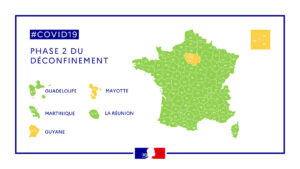 On Thursday May 28, Prime Minister Edouard Philippe spoke about Phase 2 of the lifting of the lockdown. France is now divided into Green and Orange zones. Those in the orange zones will be now governed more at a local level in terms of easing of restrictions and any other rules that may need to be put into place.
On Thursday May 28, Prime Minister Edouard Philippe spoke about Phase 2 of the lifting of the lockdown. France is now divided into Green and Orange zones. Those in the orange zones will be now governed more at a local level in terms of easing of restrictions and any other rules that may need to be put into place.
Cafés, bars and restaurants in the green zone are allowed to open up completely, but those in the orange zone must keep dine-in eating closed. They are allowed to open terraces and serve on the patio. Paris has allowed all cafés, bars, and restaurants to extend their patios into the streets. The idea is to be able to expand this space (which is minimal, depending) in order to allow for more guests.
Gyms, swimming pools and fitness centers are allowed to open fully in green zones on June 2, but will need to wait till 22 June for the orange zone. The same timeline goes for theaters, museums, and tourist attractions.
Masks are required in certain areas and on public transportation.
France reopened her borders to those in the EU, UK and Schengen regions, but kept them closed to everyone else.
Phase 3
Officially starting on June 22, 2020, France entered the third and final phase of the lifting of the lockdown.
Schools have resumed fully in the Hexagon. Up until this point, it has been optional for parents to allow their children to return back to school. Now, they need a legitimate reason to not send their children back to school or they need to prove that they can homeschool their children.
Cinemas will be allowed to open, with strict health protocol put in place in order to operate.
Restaurants, bars, and cafés in the Paris region are allowed to open their indoor seating, but again, with strict protocol in place.
- Guests are allowed to be unmasked while sitting and eating. But they need to wear a mask if they are moving around in the establishment.
- The bar is off limits.
- Tables need to be spaced 1 meter apart.
- There needs to be a log book that each guest will sign with contact information and the time they entered the establishment.
The Slow Decline
In early September, the numbers started ticking up again as testing and positive cases began to be accounted for. Paris and the Rhone départements were put on high alert on August 14 as numbers kept rising.
With the increase in free testing nation-wide, this was something to be expected. But the two areas that need to be monitored completely are the number of patients entering ICU and the number of people dying with the virus.
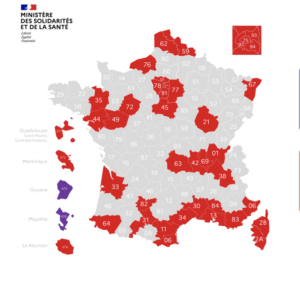 The 11 September conference of PM Jean Castex did not announce any restrictions on current life. Although the number of départments in the red went from 28 to 42. Testing is currently prioritized and 2000 more contract tracers have been hired.
The 11 September conference of PM Jean Castex did not announce any restrictions on current life. Although the number of départments in the red went from 28 to 42. Testing is currently prioritized and 2000 more contract tracers have been hired.
Those in the red zone are also subject to restrictions that can be put in place by local authorities. These were areas where the virus is still circulating at a higher rate with the movement forward of testing. The regions of Bordeaux and Marseille must come up with a plan on how to combat the rising number and turn it in to the PM.
At the beginning of October, Chief Didier Lallement, the police chief of Paris, came out with new rules and regulations for those that live in Paris and the petite couronne.
- Masks are compulsory in all public spaces, on the street, in all forms of public transportation, and in the workplace.
- A complete ban on gatherings of more than 10 people (with certain exceptions).
- Bars must close but restaurants are allowed to stay open past 10 PM as long as they are following strict protocol.
- The sale of alcohol after 10 PM is prohibited.
- The consumption of alcohol in public parks and on the riverbanks of the Seine and Canal are also forbidden.
- Parties and gatherings are also banned in public spaces.
- Community centers, gyms, swimming pools, sports centers are still to remain closed, but they are allowed to stay open for children and after school activities .
Lockdown n°1 : March to May 2020
France pulled the emergency break hard on the first lockdown. Everything came to a grinding halt at noon on March 17, 2020. This would last for 15 days with a reevaluation at the end of the 15 days for next steps.
The French people have been ordered to stay home, only venturing out for the following reasons :
- Travel to and from work IF your work is essential and working from home is not an option .
- To buy food and other essential items needed for everyday life .
- To attend medical appointments – IF they cannot be postponed or done online.
- For vital family reasons like assisting an elderly or sick family member.
- For individual physical exercise, but this must be done alone and within specific limitations (i.e. with in a certain time frame and distance of one’s domicile).
- To attend a legal summation by French police, justice or official administration .
When venturing outside for one of these reasons, we need to fill out a certificate (a.k.a. permission slip) that gives all necessary information. If one does not have access to a printer, a hand-written form will be accepted if stopped.
Social distancing when out and about became a thing of utmost importance. Making sure to maintain a safe distance of a minimum of 1 meter (3 feet) from others as well as washing hands regularly and using hand gel when necessary.
With this, working remotely from home became highly recommended and businesses were to allow their employees the ability to this as quickly as possible. Public transportation became reduced and required another special form for when using the system.
Schools at every level were closed until further notice. If they were located in a “cluster zone”, they have already closed before the March 17th date. Businesses are supposed to allow working parents the ability to work from home in order to now care for the children that were suddenly out of school. Parents were offered 20 days of paid sick leave by a special governmental decree if they were unable to work from home due their type work or if they were unable to organize childcare.
For anyone over the age of 70 who is disabled or of poor health it was highly recommended that they stay at home as much as possible.
The European Union closed its borders for 30 days in an effort to curb the spread of the virus. Only essential travel was allowed within the EU and within France. Those returning to France are allowed to travel from the airport to their address of residence.


You May Also Like
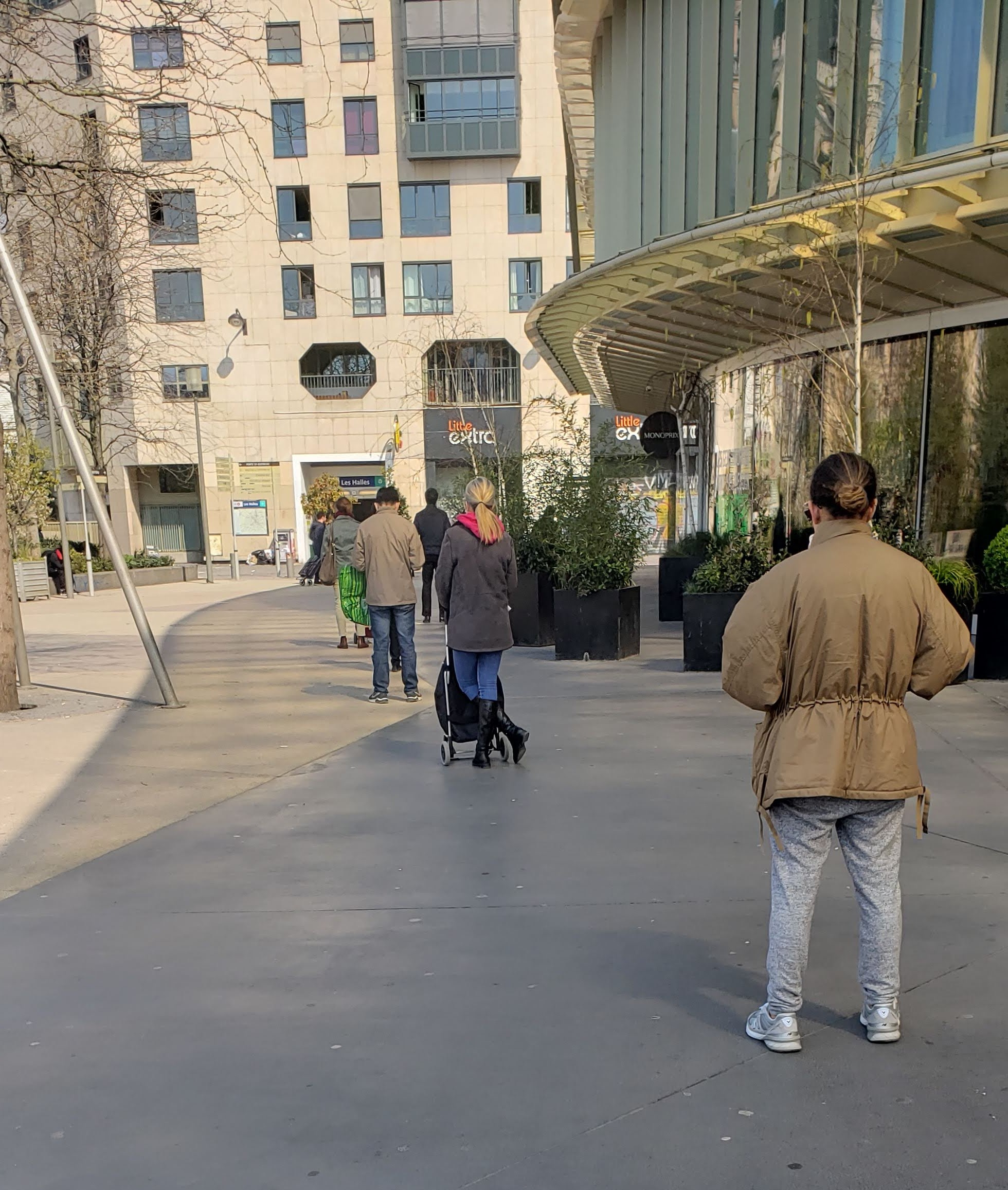
Update on life as we know it
29 April 2020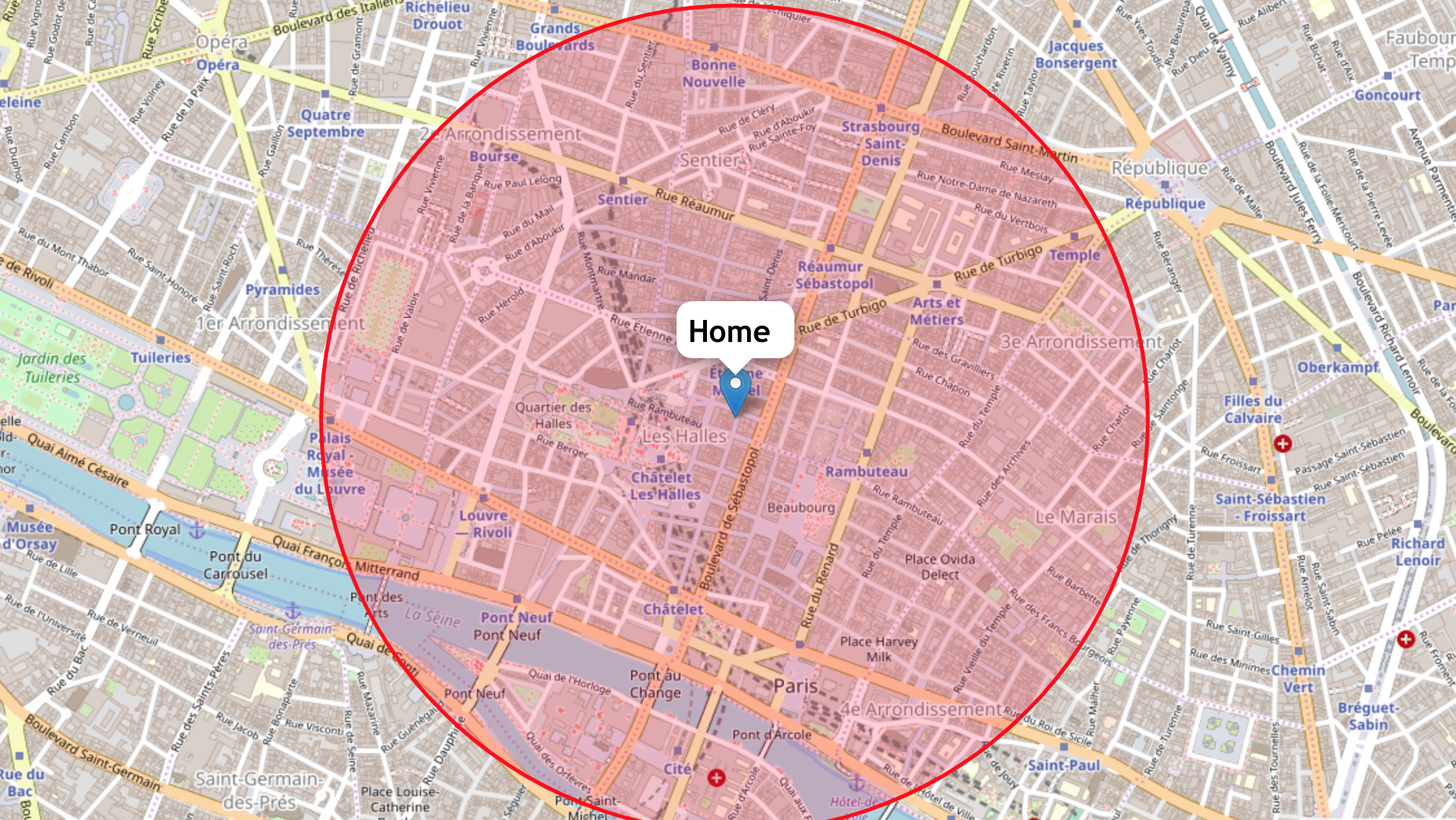
You need a permission slip for that…
30 March 2020